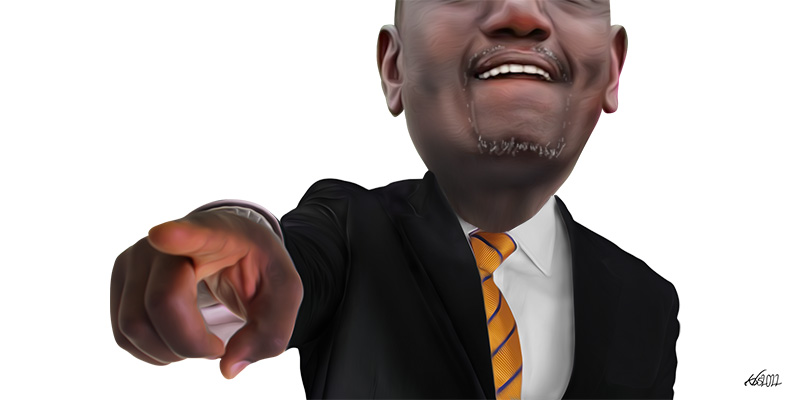The basic idea behind hustling is not to change the world, but rather to game its rules so as to change one’s status within it, going from low to high. This ultimately means accepting the world as it fundamentally is.
Kenya’s new president William Ruto has demonstrated this most ably, even using it to ramp up his campaign persona during the recently concluded elections. Having started out as a ruling party hatchet man in the 1990s Moi era, he rose to become a key player in the ethno-politics of the Kenyan Rift Valley. It was the interest taken by the International Criminal Court in the 2007 post-election violence that created a marriage of convenience between himself and what was until then his nemesis: Uhuru Kenyatta, scion of an earlier hustler-founded, but now grand, family, the epitome of what Ruto had been pitched against his whole political career—the entrenched interests of a new and landed elite.
This became an opportunity to operate fully on the national stage. This last election became in part the story of his successful determination to stay there, despite the best efforts, or so it would appear, to dispose of him once the threat of ICC convictions had receded.
A problem here is that what Kenya has always desperately needed is fundamental change. Candidate Raila Odinga’s biggest handicap was his having lived a life of being half-and-half; on the one hand, he presented himself as the anti-establishment player, determined to smash this system of historical exploitation and undeserved wealth. In that respect, he was the last of the dwindling band of 1980s would-be revolutionaries that led a meandering and error-plagued voyage in search of the kind of change needed in a former European settler economy and Western anchor-state.
On the other hand, he was also a scion of an established political dynasty. In this way, he more than once made himself part of inter-factional elite schemes and plots—of which taking the endorsement of outgoing President Kenyatta against his own Deputy President candidate Ruto was arguably the latest gambit—which only served to dilute whatever claims he may have still been making to be the progressive candidate.
Despite coming from a political dynasty of his own, birthed by his father’s own long record as a contemporary, comrade and finally victim of Jomo Kenyatta, Raila has always positioned himself as an outsider seeking to enter the system in order to break it. Then candidate Ruto’s message was the same in reverse: an actual outsider who was going, not to smash the system, but to hustle his way to its topmost levels. With his ascension, or more relevantly, with the defeat of Odinga, one can say the last of the hopes and memories of a kind of change that could favour the ordinary Kenyan are dead; this victory finally cements Kenya as a place impervious to radical political change, in which a dominant oligarchic system will remain in control, no matter who wins or loses a particular election.
“There is now in place a regime of right-wing thuggery that will run this plantation for the next twenty years.” one veteran Kenyan Kenya observer, glumly wrote to me.
However, the real point here is that this can be said of the whole region. And with this development in Kenya, a circle has been closed and the country has become fully like the rest of East Africa.
The failings of the Kenyan progressive/revolutionary movements of the 1970s and 1980s (of which Raila Odinga was a very visible part), left a situation whereby change was not going to come from outside the system, leading eventually to this “hustler” culture. First by the wider civil society that joined in the post-Moi governments in pursuit of change, and then the more directly cynical exploits that have culminated in the Ruto presidency.
“There is now in place a regime of right-wing thuggery that will run this plantation for the next twenty years.”
The few but significant reforms that actually enabled the Ruto victory to be declared were ironically the only real change that the civil society movement managed to bring to the very rigid political system. So, the irony is that these came to serve Ruto in a way they never served Odinga, despite his years of struggle that helped put them in place.
Apart from the social migration of that section of anti-colonial figures who made peace with the system and agreed to form the post-colonial regimes in partnership with those Africans that had worked for the repressive colonial state to begin with, most Kenyans remained poor, landless and exploited.
In this, Jaramogi Oginga Odinga, veteran anti-colonial agitator, co-founder of the Kenya People’s Union and of course father to fifth-time losing candidate Raila, represented the first political tradition, while Jomo Kenyatta, father to the outgoing president Uhuru, famously represented the second.
This began the great dichotomy in the mainstream of Kenyan politics: between those who felt that Independence could and should mean more for the ordinary Kenyan, and those who felt that the struggle had done enough and, increasingly, it was for every citizen to make the best they could out of the new circumstances. In short, hustlers.
There were always more options. But in the politics of pragmatism, the most accessible position, least burdened of principles, usually wins.
Hence, Museveni over Nabudere in the Ugandan struggle against Obote; Garang against the void that killed him in the quest to shape a post-Arab-Apartheid Sudan; Desire Kabila over the impenetrable musings of dia Wamba during the race to remove Mobutu, and so forth.
There is always the one “who is” versus the idea of the “who might have been”. In Kenya, this has been Raila Odinga against just about every Kenyan President from Daniel arap Moi, onward. Until now.
William Ruto’s coming to power is the ultimate triumph over idealism, an ultimate mass endorsement of the idea of pragmatism over idealism in Kenyan politics. In that sense, Kenya now fully folds into the regional template of practical fixers and hustlers willing to work within the strictures historically imposed on their people, as opposed to embarking on a quest for genuine change.
This tells us one thing, that the largest and best organized-for-extraction economy in the region is now firmly in the grip of a very determined set of interchangeable oligarchs. Their mission in life will be to do what oligarchs do: get richer.
We can now look forward to the consolidation of a region-wide elite consensus regarding the purpose of power: which, put simply, is to get rich, and then richer.
I have written it before: the wealth of Congo has enriched many a Ugandan elite group. My prediction is that our region’s politics will increasingly take on the look of a region-wide joint elite conspiracy against the ordinary peoples of the countries therein. The entire East African region, and its resources, seems up for grabs. And the vast riches of the DRC will be at the epicentre.
William Ruto’s coming to power is the ultimate triumph over idealism, an ultimate mass endorsement of the idea of pragmatism over idealism in Kenyan politics.
President Ruto’s decision to immediately implement a commitment to the long-mooted idea of an East Africa “peacekeeping” force helps to confirm this suspicion. Kenya deployed a contingent of its Special Forces just days after President Ruto’s inauguration. This idea has always been curious; apart from the United Nations force (in its second form), Uganda’s military, and occasional forays from Rwanda (and “friends”), this adds a new layer of military presence in the country: not quite African Union, and not fully EAC either, as there is no joint command. But the goal is clear: a colonial-type pacification of the natives, so as to enable elite-managed foreign extraction.
To that end, apart from Rwanda’s occasional presence, the Congolese government made up of its own notoriously ambitious elites seems to present no real objection to other interventions, but the opinion of the general population is becoming increasingly different.
An ideal situation for the hungry wolves in Kampala would be for a consensus to emerge from among the regimes of the region as to how the region’s resources can be best looted in a sustainable way, under its overall leadership as the regime that has the best, deepest and longest established links with the Western corporations that are in need of them.
President Ruto publicly acclaimed President Museveni as the “father of the region”, which is certainly a step up from the usual “father of the nation” sobriquet pressed upon perennial African incumbents.
Long-time watchers of the Museveni regime will find this description of President Museveni as apt as it is worrying. On the one hand, it helps consolidate the long-held view that Uganda effectively works as the West’s anchor state for the region.
We may finally be reaching a point of harmony among the rulers, which will be good news for their cronies and those who want to loot the region, but disastrous for the ordinary people.
Such looting involves indentured labour, displacement, environmental destruction, as well as the attendant state-backed violence to ensure that this happens. Put bluntly, a regional “peacekeeping” force would simply be a modern version of Belgian King Leopold’s Force Publique and other colonial forces rolled into one, and designed to bring a concentration of arms to bear on any localised native rebellion protesting this state of affairs.
Progress is no longer the business of government. Democracy is no longer the concern, what we have is mere electoral-ism. Within the expanded East African Community region, we now have a string of governments that hold no genuine or valuable ideological position on the long-standing, long-held, often diverted and suppressed quest for a national conversation about these things. That has finally come to an end.
The job is to manage the expanding exploitation of the mineral, labour, wildlife, fertility and energy resources on behalf of incoming foreign capital. As long as one can assure them of their security, and also help fend others off, then life is fine.
Democracy is no longer the concern, what we have is mere electoral-ism.
We may therefore finally be at a point where we have a region that thinks as one, where there are finally shared goals and talk of greater regional integration for markets, labour mobility and infrastructure. Unfortunately, these goals do not mean the same thing in their mouths, as they do in the mouths of the older traditional voices of pan-Africanism.
Instead, whatever the long-term plans of corporate America and the wider West in the region, these may now move ahead more smoothly. We can make a fairly informed guess as to what the key elements of those plans will be: “conservation”; agribusiness; energy, all with a knock-on effect on planning for massive urbanization, which means corporate finance for real estate. This may create just enough career jobs to settle the small but historically influential and noisy middle class into complacency. Certainly, the domestic Kenyan banking sector has been very nimble in getting into the DRC financial market already.
The Great Lakes Region/Nile Valley should now be best understood as a single space. It is a vast network of nearly all the major fresh water bodies on the continent. We should observe the privatisation and commercialisation of water in Kenya as the nascent stage to capture the regions water resources. With the expansion of the EAC to include the DRC, the imperialist dream of a single economic space from the Indian Ocean to the Atlantic as sought by the lumpen-explorer Henry Morton Stanley, is finally realised.
In his career-long quest to always be of the greatest use to Western imperialism (and thereby guarantee his incumbency), one can be sure that President Museveni has long been positioning himself as the conductor of this grand orchestra.
While we may now have unity at last, it would not be a unity in the interest of ordinary Africans.








